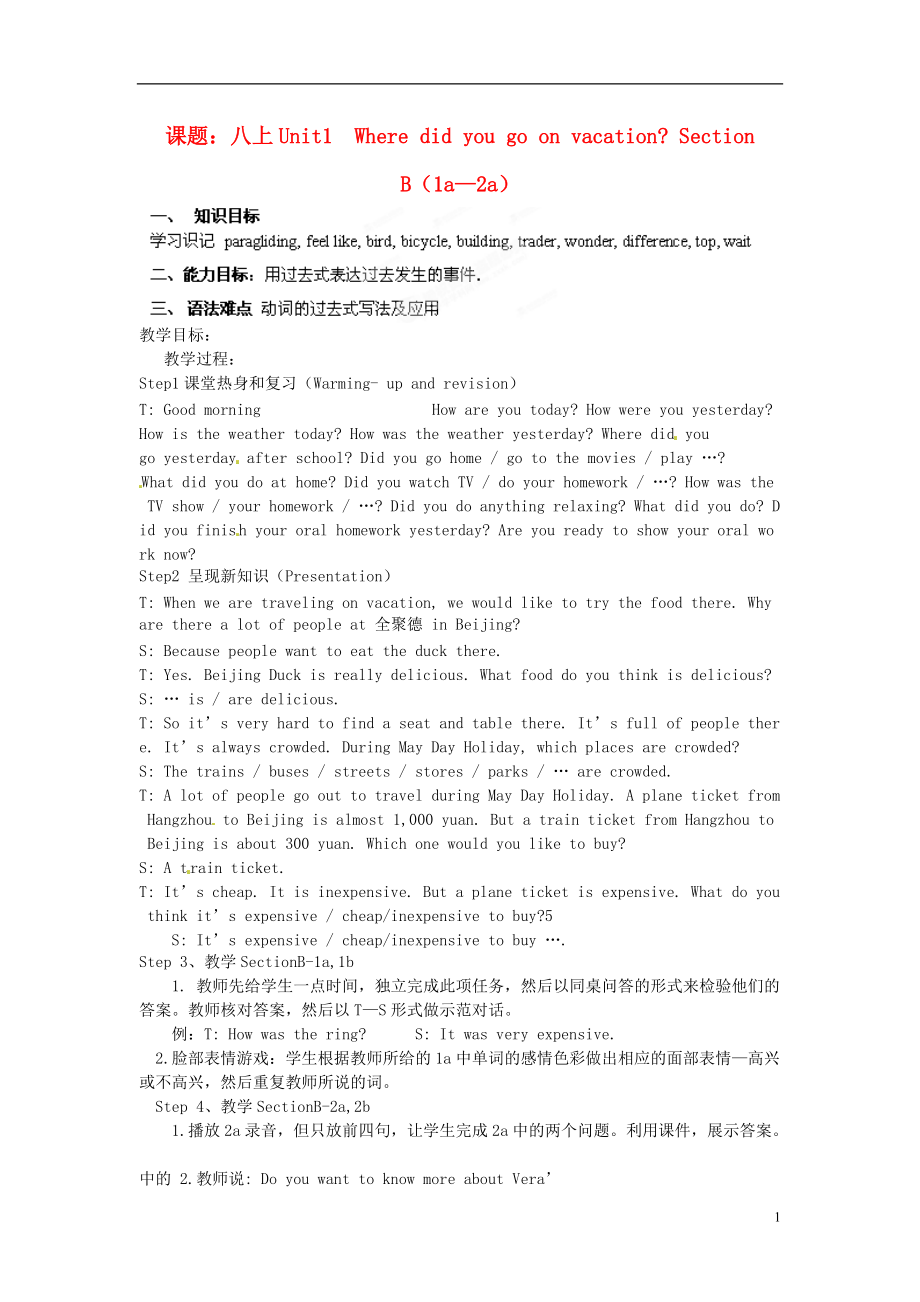《八年級英語上冊《Unit 1 Where did you go on vacation Section B(1a2a)》教學(xué)案 (新版)人教新目標(biāo)版》由會員分享�,可在線閱讀��,更多相關(guān)《八年級英語上冊《Unit 1 Where did you go on vacation Section B(1a2a)》教學(xué)案 (新版)人教新目標(biāo)版(2頁珍藏版)》請在裝配圖網(wǎng)上搜索�。
1��、
課題:八上Unit1 Where did you go on vacation? Section B(1a—2a)
教學(xué)目標(biāo):
教學(xué)過程:
Step1課堂熱身和復(fù)習(xí)(Warming-upandrevision)
T:Goodmorning Howareyoutoday?Howwereyouyesterday? Howistheweathertoday?Howwastheweatheryesterday?Wheredidyou
goyesterdayafterschool?Didyougohome/gotothemovies/play…? Whatdidyoudoathome?
2��、DidyouwatchTV/doyourhomework/…?HowwastheTVshow/yourhomework/…?Didyoudoanythingrelaxing?Whatdidyoudo?Didyoufinishyouroralhomeworkyesterday?Areyoureadytoshowyouroralworknow?
Step2 呈現(xiàn)新知識(Presentation)
T:Whenwearetravelingonvacation,wewouldliketotrythefoodthere.Whyaretherealotofpeopleat全聚德inBeijing?
3�����、S:Becausepeoplewanttoeattheduckthere.
T:Yes.BeijingDuckisreallydelicious.Whatfooddoyouthinkisdelicious?
S:…is/aredelicious.
T:Soit’sveryhardtofindaseatandtablethere.It’sfullofpeoplethere.It’salwayscrowded.DuringMayDayHoliday,whichplacesarecrowded?
S:Thetrains/buses/streets/stores/parks/…arecrowd
4�����、ed.
T:AlotofpeoplegoouttotravelduringMayDayHoliday.AplaneticketfromHangzhoutoBeijingisalmost1,000yuan.ButatrainticketfromHangzhoutoBeijingisabout300yuan.Whichonewouldyouliketobuy? S:Atrainticket.
T:It’scheap.Itisinexpensive.Butaplaneticketisexpensive.Whatdoyouthinkit’sexpensive/cheap/inexpensivet
5����、obuy?5
S:It’sexpensive/cheap/inexpensivetobuy….
Step 3�、教學(xué)SectionB-1a,1b
1.教師先給學(xué)生一點時間,獨立完成此項任務(wù)�,然后以同桌問答的形式來檢驗他們的答案。教師核對答案�����,然后以T—S形式做示范對話�。
例:T:Howwasthering? S:Itwasveryexpensive.
2.臉部表情游戲:學(xué)生根據(jù)教師所給的1a中單詞的感情色彩做出相應(yīng)的面部表情—高興或不高興,然后重復(fù)教師所說的詞。
Step 4��、教學(xué)SectionB-2a,2b
1.播放2a錄音����,但只放前四句�����,讓學(xué)生完成2a中
6���、的兩個問題�����。利用課件�,展示答案�。
中的2.教師說:DoyouwanttoknowmoreaboutVera’svacationinTokyo?Listentotherestofthedialogueandtrytofindoutthewordsforthegoodthings,andwordsforthebadthingsinthedialogue.GroupA,findoutthewordsforJ.GroupB,findoutthewordsforL.
T:Foryourwonderfuljob,IwillshowyouafacelikethisJ.
(老師作一個微笑的表情�,
7、表示對學(xué)生鼓勵�����。)
T:Butwhatwasinteresting/expensive/crowded?Nowlet’slistentothetapeagainandfinish2b.(完整地播放2a錄音。)
T:Nowlet’schecktheanswers.
(學(xué)生用完整的句子表述答案����。例如:Hervacationwasgreat.TheJapanesepeoplewerefriendly.…)
教師利用課件,給出參考答案���。
Step 5�、教學(xué)SectionB-2c
教師要求同桌編對話�����,談?wù)撍麄兊募倨?�。一個是Vera�,另一個是Vera的朋友。教師可創(chuàng)設(shè)一個情境:
8��、Veraisyourfriend.ShejustcamebackfromTokyo.Andyoualsocamebackfromyourvacation.YouwenttoBeijingor…Nowpleasemakeupadialoguewithyourdeskmate.Youtwotalkaboutyourvacations.Trytousethefollowingpatterns:
(1)Wheredid…?(2)Whatdid…?(3)Didyou…?
(4)Howwas…?(5)Howwere…?
叫幾組學(xué)生將對話表演出來��。教師給予各組學(xué)生都給予鼓勵性評價�。
Step 6、作業(yè) 1.Goonmakingupyourdialogueswithyourpartnerandpolishit.
2.Previewp.63―3a,readafterthetapeandtrytounderstandthediary.
教學(xué)反思:
2
 八年級英語上冊《Unit 1 Where did you go on vacation Section B(1a2a)》教學(xué)案 (新版)人教新目標(biāo)版
八年級英語上冊《Unit 1 Where did you go on vacation Section B(1a2a)》教學(xué)案 (新版)人教新目標(biāo)版

